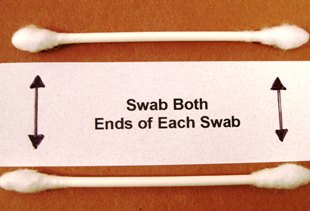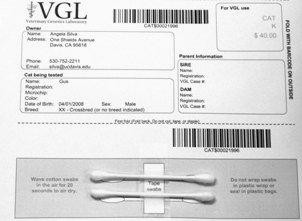Quick Summary
Click here for Price and Turnaround Time
Phenotype: The presentation of PKD1 is similar to one of the most common causes of death for any cat, renal failure. Early onset, bilateral presentation (both kidneys), and multiple cysts are all traits of PKD1. The kidney cysts for PKD1 present early, often before 12 months of age. Renal failure, however, usually occurs at a later age.
Mode of Inheritance: Autosomal dominant
Alleles: N= Normal/Unaffected, P= Polycystic kidney disease (PKD1)
Breeds appropriate for testing: Persian, Persian crosses and Persian-derived breeds (includes British Longhair, British Shorthair, Burmilla, Domestic Shorthair, Exotic Longhair, Exotic Shorthair, Foldex, Highland Fold, Highland Straight, Himalayan, Maine Coon, Napoleon, Ragamuffin, Ragdoll, Scottish Fold, Scottish Straight, Selkirk Rex), Devon Rex, Siberian
- Cats with N/N genoytpe will not have this heritable form of polycystic kidney disease and cannot transmit this PKD1 variant to their offspring.
- Cats with N/P genotype will be affected by this heritable form of polycystic kidney disease, though severity of symptoms cannot be predicted. They will transmit this PKD1 variant to 50% of their offspring, and those offspring will inherit this polycystic kidney disease.
- Cats with P/P genotype are suspected to be lethal and therefore are unlikely to be born and/or survive.
$44 one test per animal
Also available as part of the following packages:
$66 this test + Persian PRA (PRA-pd) test
$66 this test + Scottish Fold
$66 this test + one test from list below
$88 this test + two tests from list below
$110 this test + all tests from list below
Cat DNA tests are carried out using cells brushed from your cat's cheeks and gums using household cotton swabs.
The cat DNA submission form with instructions and a place to tape the cotton swabs is sent to you via email after you place an order, and can be printed from your home computer. DNA test kits are no longer mailed.
Instructions
Step-By-Step:
1.
 Purchase regular household cotton swabs for cat DNA collection (the cotton swabs can be purchased at a pharmacy or drug store)
Purchase regular household cotton swabs for cat DNA collection (the cotton swabs can be purchased at a pharmacy or drug store)
2.

Make sure the cat has not had anything to eat or drink for at least 1 hour prior to collecting sample.
When swabbing kittens, isolate each kitten from the mother, littermates and any shared toys for 1 hour prior to swabbing. Kittens should not have nursed or eaten for 1 hour prior to collecting sample.
If collecting samples from more than one cat, make sure to sample one cat at a time and wash your hands before swabbing another cat.
3.
 Use both ends of the two cotton swabs for a total of four swabs.
Use both ends of the two cotton swabs for a total of four swabs.
4.
Place the cotton head of the swab between the cat’s gums and cheek and rub or rotate the swab back and forth for 15 seconds. Repeat with each cotton swab head, for a total of 4 swabs. We recommend swabbing a different area of the gums with each swab head.
5.
Wave the swab in the air for 10-15 seconds to air dry it before attaching it to the submission form.
6.
 After swabbing the cheek and gums, tape the cotton swabs to the bar-coded submission form printed from your MyVGL account.
After swabbing the cheek and gums, tape the cotton swabs to the bar-coded submission form printed from your MyVGL account.
ATTENTION:
- Do not collect saliva/drool – the key to obtaining a good sample is getting cheek cells on the swab.
- Do not rub swab on the cat’s tongue or teeth – this will result in poor quality sample.
- Do not collect a sample from a kitten that has recently nursed – the mother’s genetic material can rub off on the kitten’s mouth and contaminate the sample.
Polycystic Kidney Disease (PKD) is a well documented abnormality in domestic cats. Cystic kidneys can sporadically occur in any population of cats. PKD is not a new disease and has been reported in the literature for over 30 years. The heritable form of PKD1 may not have initially occurred in Persians as a new mutation, but perhaps in random bred cats. Unfortunately, PKD1 does not have a strong clinical presentation. The presentation of PKD1 is similar to one of the most common causes of death for any cat, renal failure. Thus, PKD1 has gone unnoticed for many years and has spread throughout the Persian breed. Any breed that has used Persians in their foundation or propagation should have concerns for PKD1.
Early onset, bilateral presentation (both kidneys), and multiple cysts are all traits of the heritable form of the disease. The kidney cysts for PKD1 present early, often before 12 months of age. Renal failure, however, usually occurs at a later age. Thus, PKD1 is considered a late onset renal disease. In the fancy cat breeds, PKD1 is inherited as an autosomal dominant condition. This implies that only one copy of the altered version of the gene is required to produce PKD1. Generally, 50% of PKD1 positive cats' offspring will inherit PKD1. A positive cat could potentially be homozygous for PKD1 and all offspring produced would have PKD1. It is suspected that cats that are homozygous for PKD1 are not abundant and the homozygote form could be lethal in utero or severely affected at a very early age. Further research is required to determine the effects of the homozygous condition.
It is estimated over 37% of Persians have PKD1, a breed that accounts for nearly 80% of the cat fancy. Many lines and catteries have been able to greatly reduce this frequency by using ultrasound screening methods and improved breeding practices.
Sections reprinted with permission of Leslie A. Lyons, Ph.D.
